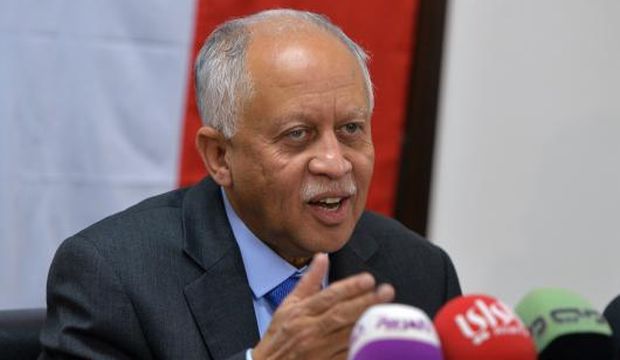
Yemen’s Foreign Minister Riyadh Yassin speaks during a press conference at the Yemeni embassy, in Kuwait City, Kuwait, on April 20, 2015. (EPA/Raed Qutena)
Kuwait City and Riyadh, Asharq Al-Awsat—Saudi Arabia and its allies involved in Operation Decisive Storm targeting the Houthi movement in Yemen have announced a new development plan to help rebuild the country after the operation achieves all its goals.
“When [political] legitimacy returns to Yemen, [we will begin] a plan to rebuild and develop the country. This will be an ‘Arab Marshall Plan,’ which I am calling ‘The King Salman Development Plan for Yemen,’” Yemen’s Foreign Minster Riyadh Yassin said on Monday, naming the plan after Saudi Arabia’s King Salman Bin Abdulaziz and making reference to the Marshall Plan, a US initiative proposed by secretary of state George Marshall to help rebuild European countries following the aftermath of the Second World War.
Speaking during a visit to Kuwait, Yassin pointed out that the plan had effectively already begun, after King Salman pledged 274 million US dollars’ worth of aid to Yemen on Friday, in response to an appeal by the United Nations.
Yassin also added that the plan had been suggested by Yemeni officials loyal to the country’s internationally recognized President Abd Rabbuh Mansur Hadi to their Arab allies, with Saudi Arabia and other Gulf countries at their head, and that they had all “welcomed the idea” and “expressed their readiness” to participate.
The plan will be able to utilize existing mechanisms used by the Friends of Yemen Group, Yassin pointed out, which has previously organized and delivered much-needed aid to the country, the Arabian Peninsula’s poorest.
This comes as Saudi Arabia’s Defense Ministry announced on Monday that Operation Decisive Storm had now entered its second phase.
“Moving from on phase to another does not necessarily mean our efforts will be reduced, just that they will be distributed more evenly on the ground,” Defense Ministry spokesman Brig. Gen. Ahmed Asiri said.
Speaking to reporters gathered at the Riyadh Airbase, he said the first phase of the operation had achieved all its goals, which focused on airstrikes targeting the movement of weapons and ammunition and weapons caches belonging to the Iran-backed Houthi militias.
He said the second phase of the operation would see a reduction in the intensity and frequency of the airstrikes, focusing more on targeting Houthi militias on the ground and increasing efforts to help Yemeni civilians and deliver humanitarian aid.
Asiri also revealed that Houthi militias had boarded an aircraft carrying aid workers and supplies from the Médecins Sans Frontières international NGO, and had prevented the plane from leaving Sana’a Airport.
The Houthis have been in control of Sana’a since September, after the Shi’ite movement’s followers and militias spread across the capital, occupying government buildings and military installations.
Saudi Arabia and its Arab allies have accused Iran and Yemen’s former ousted president Ali Abdullah Saleh of aiding the Houthi advance across the country. Both Tehran and Saleh have denied their involvement.
In February the Houthis staged a coup in the country, also placing President Hadi and other officials such as former prime minister, and now vice president, Khaled Bahah under house arrest.
Both Bahah and Hadi later fled from Sana’a, with Hadi heading to Riyadh in March to call for Arab-wide military intervention in the country to restore political legitimacy.
Nasser Al-Haqbani contributed additional reporting from Riyadh.
